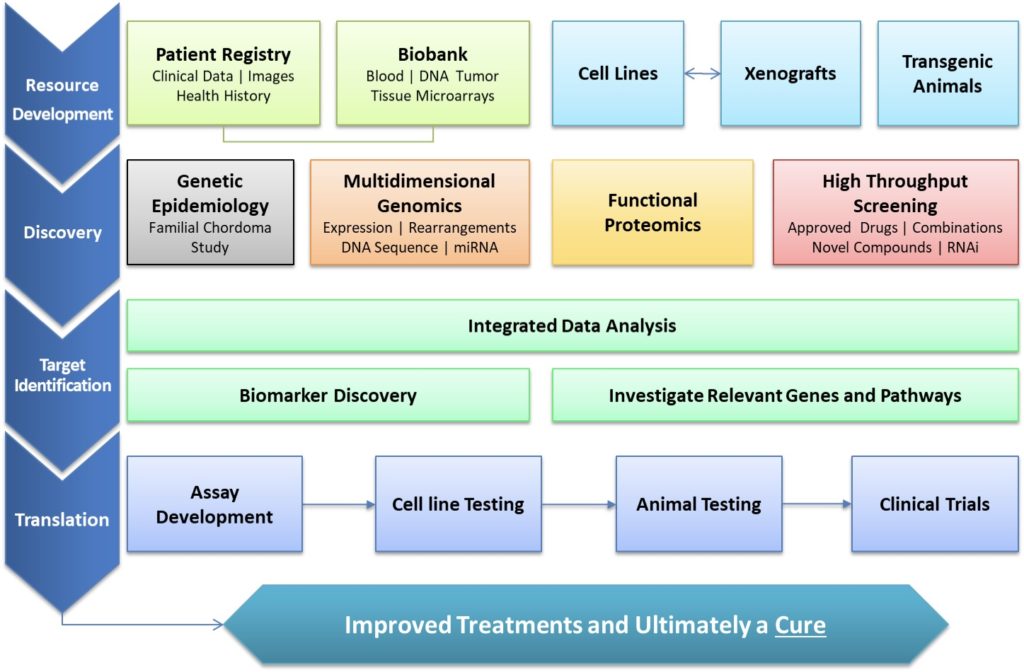Myoepithelial Carcinoma Biology and Drug Discovery
EWSR1 Orphan Cancers Program
Mission Objective:
The goals of this multi-year research program aim to answer the fundamental questions about Myoepithelial Carcinoma (MEC) biology and treatments. MEC is a rare cancer of children, teenagers and adults that can arise from the salivary glands, kidney and sometimes from soft tissue like muscle. Due to the absolute rarity of this cancer, there is a biological lack of understanding of this disease and no treatment options specific to MEC currently exist. cc-TDI is looking to change that.
Specifically, cc-TDI scientists are interested in further understanding the mutations fusing the EWSR1 gene to another gene in MEC. The EWSR1-KLF15 gene fusion, and related gene fusions, are believed to be responsible for the development and progression of this disease. Through the development of a biobank registry, sequencing effort, cell line & mouse model resource, and EWSR1-KLF15 biology program, this project aims to offer resources that will be used by scientists around the world working to discover treatment options for MEC with the EWSR1-KLF15 fusion.
Figure 1. Example of the “Roadmap to a Cure” figure adapted from Chordoma Foundation, image by Josh Sommer.

How can I contribute to this research project?
Donating your own MEC tissue (or that of your child below age 18) for genetic sequencing helps us to develop a genomic landscape for MEC. Tissue donations take place via the CuRe-FAST program, a cancer bio-banking registry at cc-TDI (Children’s Cancer Therapy Development Institute) in Portland, Oregon at no cost to you. (This program is supported by the Sam Day Foundation, and capacity is augmented significantly by the Childhood Cancer Project.)
Donating tissue samples (either stored from prior procedures or fresh from upcoming surgeries) is a straight forward process and often no additional procedures are performed. Privacy is protected as samples are de-identified. Thus, you will not receive the results from your specific data as your data will remain anonymous and be shared with clinicians and scientists to find MEC treatment options. For more information or to participate, please contact cc-TDI’s CuRe-FAST lead Kiyo, at kiyo@cc-tdi.org.
What happens next?
After a simple enrollment process into the CuRe-FAST tumor banking program, Kiyo will work with your hospital to collect the tissue samples. As patients contribute, samples are received, processed, and carefully stored at cc-TDI. When 20-30 samples have been obtained, the tumors will be sent for DNA and RNA genomic sequencing. This critical data creates the foundational work for MEC researchers to understand it’s genomic landscape, bringing us closer to a cure!
How can I help in other ways?
This work is being conducted in honor of Sebastián, who at the age of two and a half has been battling MEC since 2021. It is with the support, partnership and advocacy of Sebastián’s parents, Michael and Naomi, that this project is taking shape. If you are interested in learning more about the project or becoming a partner, please contact Naomi Natale at naomi@curemec.org.
For additional information on MEC visit www.curemec.org.
Collaborative funding for this multi-year project will include federal and foundations grants as well as a grassroots crowdfunding campaign. To support this effort, please visit https://cc-tdi.kindful.com/?campaign=1176300.

